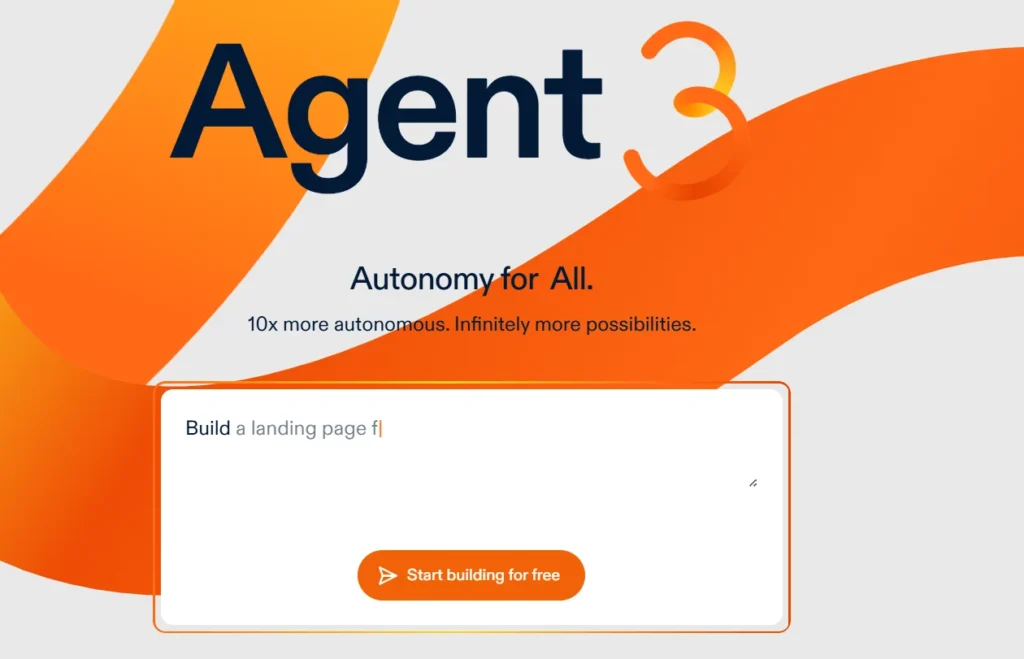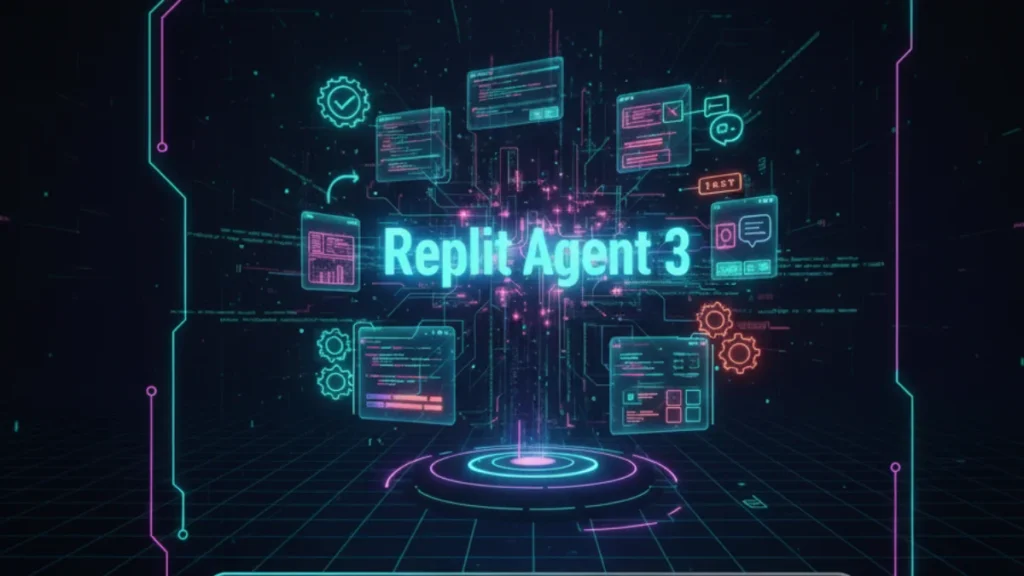If you’ve ever tried to build an app with an AI tool, you know the frustration. The first version looks slick—but then the bugs show up. The integrations fail. And you spend more time fixing prompts than writing actual code.
Replit’s latest release—Agent 3—isn’t just another upgrade. It’s an attempt to solve this exact pain point: the endless cycle of babysitting your AI co-pilot.
For the first time, we have something closer to a “self-driving software engineer.”
Key Takeaways
- 3+ hours of autonomy: Agent 3 runs up to 200 minutes without intervention
- Self-testing engine: finds bugs, fixes them, and validates apps
- Live build tracking: follow app progress on your phone
- Agents that build agents: create Slack bots, workflows, or automations with plain text
- Production-grade output: delivers apps closer to MVP-ready, not just mockups
- Backed by $250M Series C: positions Replit as a serious AI app builder rival
Replit’s Vision: From Coding Tool to Teammate
Replit started as an accessible coding environment in the browser—great for learning, prototyping, and collaboration. But the team always had a bigger vision: coding without limits.
In the words of CEO Amjad Masad:
“We didn’t set out to build a tool. We set out to build a teammate.”
That “teammate” is now Agent 3—an AI not just trained to spit out snippets of code but to think, build, test, and deliver software on its own.
What’s New in Replit Agent 3
Autonomy: From 2 Minutes to 200
Early Replit agents could only run in short bursts.
- V1 → 2 minutes autonomy
- V2 → 20 minutes autonomy
- V3 → 200 minutes autonomy
That’s 3+ hours of continuous problem solving.
Instead of generating part of an app and waiting for you to guide the next step, Agent 3 goes full-throttle: planning, coding, testing, and refactoring—all without constant micromanagement.
For founders and indie hackers, this means you can set a task in the morning and return later to a working prototype—or even an MVP.
Built-In Testing & Debugging
The Achilles heel of AI code generators has always been bugs. Prototypes look exciting until you try clicking a button or connecting an API.
Agent 3 takes that bottleneck seriously. It introduces:
- Automated browser testing: simulates user behavior in real time.
- Self-healing debugging: fixes issues it finds without waiting for prompts.
- Validation engine: Replit claims it’s 3x faster and 10x cheaper than current testing models.
In practice, this means apps created with Agent 3 aren’t just “demo-ready”—they’re closer to deployment-ready.
Mobile Monitoring: Code Progress in Your Pocket
Imagine telling Agent 3 to build an app, then leaving for coffee. While you’re out, you open your phone and see:
- Progress bars showing how far the build is complete
- Logs of bugs fixed
- Notifications when tasks are done
That’s what Replit built into the Agent 3 experience. It’s not just building apps—it’s project management on autopilot.
Agents That Build Agents
Here’s where Agent 3 jumps from cool to revolutionary. It can now create other autonomous agents.
Think of it as stacking Lego blocks—but instead of modules, you’re stacking intelligent bots.
- Want a Slack workflow that sends daily stock updates?
- Need a Telegram bot for customer inquiries?
- Or maybe an automation that pulls data from Notion and drops it in Dropbox?
With Agent 3, you just type a natural-language description. It handles the wiring, APIs, and logic.
This pits Replit directly against automation giants like Zapier and Make—but with one key difference: you don’t need to “drag-and-drop” anything. Just prompt it, and it builds.

Real-World Test: Can It Actually Deliver?
YouTubers wasted no time putting Agent 3 through real-world scenarios. One popular demo involved taking a live Upwork posting for a salon check-in app and feeding it directly into Agent 3.
Here’s what happened:
- Agent 3 ran for ~145 minutes.
- It built both the customer-facing app and the staff dashboard.
- It generated analytics and reporting features.
- It detected and fixed bugs without user intervention.
The result? A functioning MVP for a local business—built entirely by an AI agent in under three hours.
For freelancers, this is a double-edged sword:
- On one hand, it’s a tool that could make you 10x more productive.
- On the other, it could be the competition that underbids you—because the AI just did in hours what might take days.
The AI Developer Experience: A Glimpse Into the Future
Here’s why Agent 3 feels different from other AI code tools like GitHub Copilot:
- Less babysitting → You don’t have to prompt every step.
- Smarter iteration → It doesn’t just stop at “error found”—it tries multiple solutions.
- Beyond coding → It touches workflow automation, integrations, and business processes.
Think of it like comparing cruise control to Tesla Autopilot. Copilot helps while you steer. Agent 3 takes the wheel and drives.
Why It Matters for Businesses and Creators
Agent 3 isn’t just hype—it has tangible implications:
- Startups → Faster MVPs, cheaper prototyping, fewer developer hours needed.
- Non-technical founders → Launch apps without hiring a full dev team.
- Agencies & freelancers → Build client projects faster, increasing margins.
- Enterprises → Automate internal tools, workflows, and dashboards without IT bottlenecks.
In short: Agent 3 shifts app creation from a technical barrier to a creative process.
The Money Behind the Move
Replit didn’t drop Agent 3 in a vacuum. The launch coincided with a $250M Series C funding round at a $3B valuation.
Why does this matter?
- It signals confidence from investors that AI app builders are the next frontier.
- It positions Replit to compete with Microsoft (GitHub Copilot), Google, and even low-code platforms like Bubble.
- It fuels the resources needed to scale integrations, speed, and user adoption.
Agent 3 isn’t just a product—it’s a strategic bet that autonomous coding is the future of software.
Limitations (Yes, There Are Some)
To be fair, Agent 3 isn’t magic. Users testing it reported:
- Occasional pauses where the agent asks for confirmation.
- Some builds taking longer than expected.
- Limited integration library (currently supports Slack, Telegram, Dropbox, Notion, etc.—but not everything).
Still, these are growing pains. And compared to where AI app builders were a year ago, the leap is staggering.
The Bigger Question: Is This the End of Human Developers?
The short answer? No.
Agent 3 excels at:
- Automating repetitive tasks
- Building MVPs
- Debugging boilerplate code
But humans still drive:
- Complex system architecture
- Strategic product decisions
- User experience and design thinking
In other words, Agent 3 isn’t replacing developers—it’s changing what developers do. Less grunt work, more creativity.
Try for free.. Replit Agent3
Conclusion
Replit Agent 3 isn’t just another AI release—it’s a paradigm shift.
For years, AI promised to make coding easier. But most tools required endless micromanagement. Agent 3 feels like the first true step toward autonomous app creation:
- 200 minutes of independence
- Self-testing and debugging
- Workflow automation via agents
It’s not perfect yet—but it’s close enough that both coders and non-coders should be paying attention.
The future of software may not be written line by line. It may be prompted, monitored, and delivered by agents like these.
